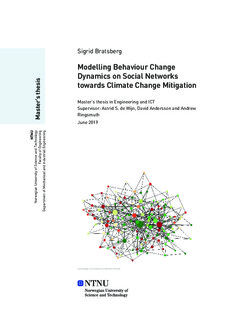| dc.contributor.advisor | de Wijn, Astrid S | |
| dc.contributor.advisor | Andersson, David | |
| dc.contributor.author | Bratsberg, Sigrid | |
| dc.date.accessioned | 2019-10-10T14:00:14Z | |
| dc.date.available | 2019-10-10T14:00:14Z | |
| dc.date.issued | 2019 | |
| dc.identifier.uri | http://hdl.handle.net/11250/2621453 | |
| dc.description.abstract | Denne oppgaven handler om spredningen av altruisme i en befolkning som står overfor utfordringen med farlige klimaendringer. Befolkningen er delt inn i tilhengere og motstandere basert på holdninger, og satt inn i et sosialt nettverk for å simulere romlig struktur. Bruken av et nettverk skyldes funn som beskriver at strukturen av mennesker i en befolkning påvirker spredningen av meninger og kan endre resultatet vesentlig. Den enkle dynamikken er laget med både et kontinuerlig og diskret alternativ for samarbeid. Simuleringer er gjennomført basert på en samensatt modell. Resultatene viser at vi kan få en resulterende befolkning av kun motstandere, kun tilhengere eller en likevekt mellom begge strategiene, avhengig av de forskjellige parametrene. Personer med sterke meninger kan brukes i de kontinuerlige tilfellene for å fasilitere en endring i befolkningen til alle er enige, og en ekstern påvirkning kan føre til endring i sluttilstanden for både kontinuerlig og diskret dynamikk. I tillegg finner man samlinger av mennesker som er enige, slik at grupper med samme strategi viser seg å være mer stabile. | |
| dc.description.abstract | This thesis is concerned with the spread of altruism in a population facing the problem of dangerous climate change. The population is divided into cooperators and defectors as in social dilemmas, and put into a network to simulate the spatial structure of relations. The use of a network is due to findings describing that the structure of people in a population influences the spread of opinions and may significantly change the result. The simple dynamics are made with both a continuous and discrete option of cooperating and put into a model. The results from the simulations show that we could have a resulting population of all defectors, all cooperators or equilibrium of both strategies depending on the different parameters. People of strong opinions could be used in the continuous cases to induce a change in the overall population until all agree, and external impacts could force both types of models to change the final state. Moreover, the use of networks introduces the phenomenon of local grouping, where people of the same strategy tend to be more stable together. | |
| dc.language | eng | |
| dc.publisher | NTNU | |
| dc.title | Modelling Behaviour Change Dynamics on Social Networks towards Climate Change Mitigation | |
| dc.type | Master thesis | |
